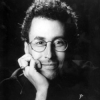Tony Kushner

Tony Kushner
Anthony Robert "Tony" Kushneris an American playwright and screenwriter. He received the Pulitzer Prize for Drama in 1993 for his play Angels in America: A Gay Fantasia on National Themes. He co-authored with Eric Roth the screenplay for the 2005 film Munich, and he wrote the screenplay for the 2012 film Lincoln, both critically acclaimed movies, for which received Academy Award nominations for Best Adapted Screenplay. For his work, he received a National Medal of Arts from President Barack Obama...
NationalityAmerican
ProfessionScreenwriter
Date of Birth16 July 1956
CityNew York City, NY
CountryUnited States of America